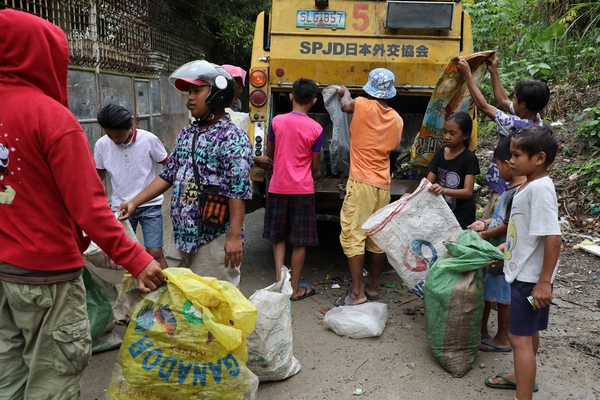
Residents of a Cebu City barangay help load their trash to the garbage truck during a garbage collection round in their area in this March 20, 2017 photo.
CDN FILE PHOTOS
NO SEGREGATION, NO COLLECTION POLICY
Education before implementation.
This is what the Cebu City government is doing before fully and strictly implementing the “no segregation, no collection” policy in the city with the cooperation of the people in the barangays.
Nida Cabrera, Cebu City Environmental and Natural Resources Office (CCENRO) head, said that they had already started the orientation of the policy to the barangays last month.
Cabrera said that they were supposed to implement this policy this month but they postponed it after some barangays requested that they also would be included in the orientation.
“We are almost done with our orientation,” Cabrera said.
This time, Cabrera said that the re-implementation of the policy, which will start on March, will be successful.
“With the cooperation of the barangays, ma-successful ta kay dapat sila man unta ang una nga mo-implement (of this policy),” Cabrera said.
And by an education campaign and strict enforcement of the policy, Cabrera believes that this time the city will be successful.
She said that if the strict implementation of the “no segregation, no collection” policy would succeed, the city would save from 20 to 30 tons of garbage in a day if the residents would segregate properly.
Roberto Cabarrubias, Department of Public Services (DPS) head, in an April 2017 CDN report said that the city generates close to 600 tons of garbage a day.
Cabarrubias was then discussing about the garbage problem since this highly urbanized city had more than 700,000 residents.
Cabrera said that they would strictly implement the Cebu City Ordinance No. 2031, which mandates the segregation of trash at the source, and of course the City Ordinance No. 1361 or the Anti-Littering Ordinance.
Residents of a Cebu City barangay bring garbage to the garbage collectors of the city in this March 20, 2017 photo.
CDN FILE PHOTO
Under the policy, residents should not throw their trash anywhere especially in public areas.
The public should learn to segregate their garbage to four classifications: biodegradable, non-biodegradable, residual waste, and special waste.
Biodegradable wastes are left over food, fruits, or vegetables, and papers among others.
Non-biodegradable garbage are canned goods, utensils, bottles, styrofoam, and plastics.
Residual wastes are those napkins, diapers, rags, and tissues.
While special wastes are batteries, paints, bulbs, machines, gadgets, and cellphones.
The Barangay Environmental Officers (BEOs) in each barangay will be the one monitoring residents who will violate the “no segregation, no collection” policy.
She said that CCENRO personnel had already put up tarpaulins in every barangay about the segregation policy.
Cabrera said that if a resident would not follow the policy, then they would be fined P500, do community service, or imprisoned for one to six months as based on Republic Act 9003 and City Ordinance 1361 and 2031.
Cabrera also said that the barangays should also follow the scheduled collection of the different types of garbage.
Biodegradable garbage will be collected during Mondays, Wednesdays, Fridays, and Saturdays from 5 p.m. to 7 a.m.
Non-biodegradable and residual wastes will be collected on Tuesdays, Thursdays, Sundays at the same time.
Residual wastes should be in separate bags with non-biodegradable.
Special wastes schedule collection has yet to be announced.
Cabrera also assured that the city has enough garbage trucks to maintain the flow of the collection schedule.
She cited the 20 garbage trucks of the DPS and those that the city rent from Pasahero Motors Corporation (Pamocor).
The city rented 11 dump trucks and 10 compactor trucks of the Pamocor starting this month until June this year.
For his part, Cebu City Councilor Joel Garganera said he welcomed the strict reimplementation of the policy which he believed should have been done a long time ago.
Garganera, who was the former barangay captain of Tinago, cited the replacement of the BEOs, who were trained to issue tickets and monitor violators of the policy during the Rama administration, as one of the reasons the implementation of the policy failed.
He said that the trained BEOs were replaced a few months when the new administration took over.
“Aware na unta ang mga BEOs ato nga time but all of a sudden pag-take over gipangilisan tanan. So nawala nasad ang pag-implement sa policy (The BEOs were already trained and then they were replaced. So the implementation of the policy suffered),” Garganera said.
“So we are going to start all over again,” Garganera said.
Garganera said that he hoped this time BEOs would be well trained in strictly implementing the policy.
He said he believed that citation tickets would really be a deterrent in violating the policy.
Aside from that, he also called on the public to cooperate with the Cebu City government in making the implementation of the policy successful.

